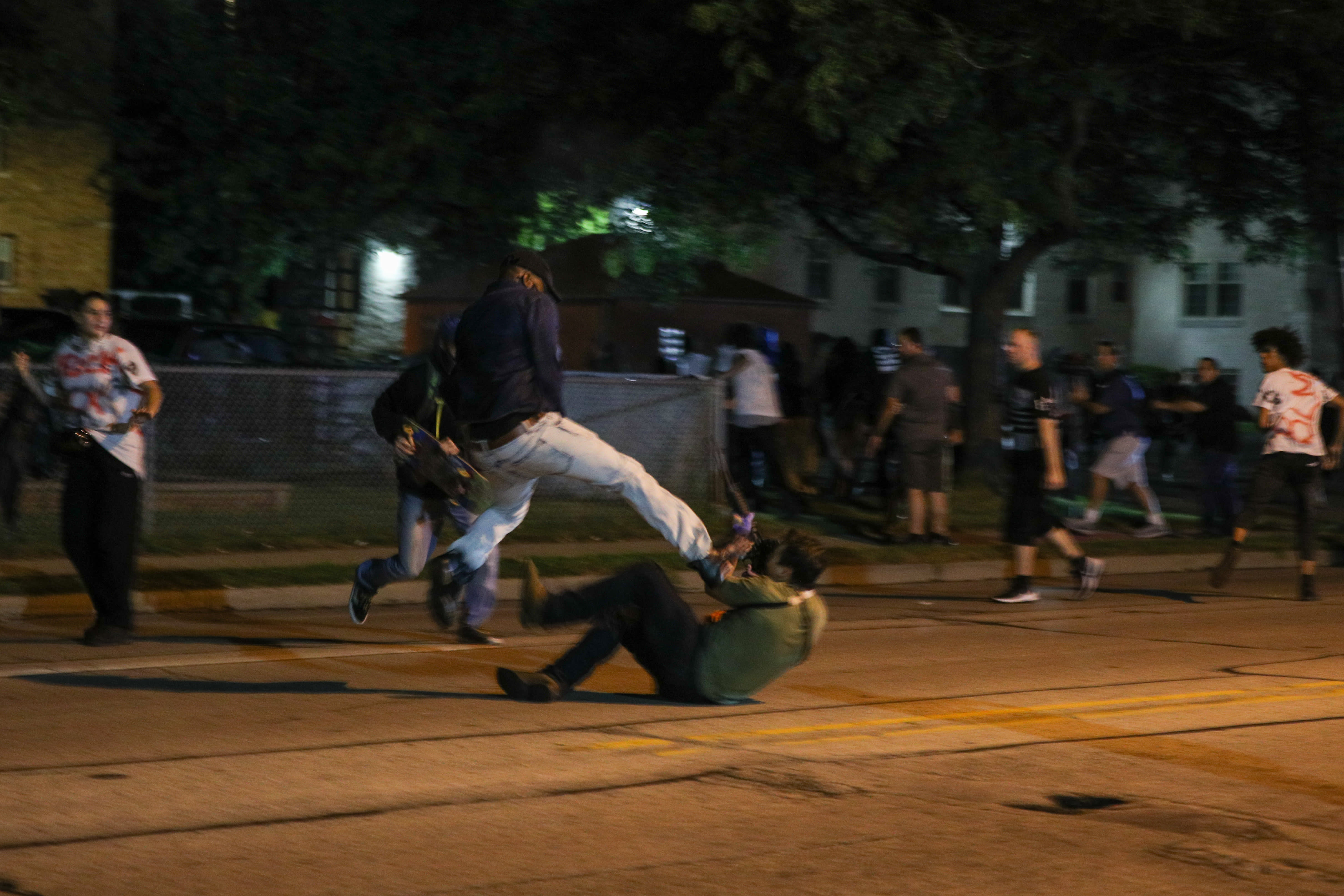
Clashes between protesters and armed civilians, who protect the streets of Kenosha against the arson, break out during the third day of protests over the shooting of a black man Jacob Blake by police officer in Wisconsin, United States on August 25, 2020.
Tayfun Coskun | Anadolu Agency | Getty Images
With President Donald Trump refusing to commit to a peaceful transition of power in the event that he loses the upcoming election and violent clashes already unfolding in a number of states, political analysts are uniquely fearful as November approaches.
Asked last week to commit to conceding should the November 3 election go in favor of Democratic nominee Joe Biden, Trump again cited unfounded claims about mail-in ballots leading to widespread voter fraud in justifying his reluctance.
He reiterated this during Tuesday night’s chaotic presidential debate, calling mail-in voting a “disaster” and again suggesting that he would not accept a result that goes against him.
The president also refused to disavow white supremacists and militia groups in his corner, telling the Proud Boys — a violent, all-male far-right extremist group — to “stand back and stand by.” He instead directed his ire at Antifa and “far-left” groups.
The comment was interpreted across the group’s social media pages as marching orders, according to NBC News, and the Proud Boys have already made t-shirts available emblazoned with Trump’s words. The Proud Boys were classified as an extremist group by the FBI in 2018.
Trump walked back his remarks on Wednesday, claiming he did not know who the Proud Boys were and instructing them to “stand down and let law enforcement do their work.”
UCL Associate Professor of Global Politics Brian Klaas told CNBC ahead of the debate that Trump’s tactics in the runup to the election bear “the hallmarks of undemocratic countries” and said he would not be surprised if violence broke out in the aftermath of a close election. A spokesperson for the Trump Campaign was not immediately available for comment when contacted by CNBC.
“All the red flags that you see in other countries that have political violence are being raised in the United States right now, and you are getting extremely incendiary rhetoric from the president himself,” Klaas told CNBC’s “Squawk Box Europe” on Friday, adding that mail-in voting has long been a part of U.S. elections with high levels of integrity.
“But he is convincing his supporters, which is tens of millions of people, that if he loses, that it is because the election will be rigged, which is false. I worry that if there is a close result, a contested result, that he will call on his supporters to take action,” Klaas added.
Supreme Court fight
Klaas suggested that the likelihood of political violence is dependent on the electoral margins, with an “unequivocal” Biden victory making it less plausible for Trump to seek to alter the result via the Supreme Court.
Central to the latter scenario is the Republican push to replace the late Justice Ruth Bader Ginsburg with conservative judge Amy Coney Barrett before election day, a move that would give the court a 6-3 conservative tilt.
Democrats and some Republicans have suggested that Coney Barrett should recuse herself from any election-related cases if confirmed prior to November 3. However, Republicans are expected to have enough senate votes to force through her appointment.
Trump and fellow Republicans have argued that the GOP’s retention of the senate in the 2018 mid-term elections gives the incumbent administration the mandate to select the next justice, where Democrats believe installing a justice now removes the electorate’s right to choose.
Republicans famously blocked a vote on former President Barack Obama’s 2016 Supreme Court nominee, Merrick Garland, on the basis that it was an election year, and the nomination came almost nine months before the election. Senate Majority Leader Mitch McConnell said at the time that “the American people should have a voice” and that the vacancy “should not be filled until we have a new president.”
Barbara Perry, director of presidential studies at the University of Virginia’s Miller Center, also argues that Coney Barrett should recuse herself from any involvement of the Supreme Court in the electoral process, with voting having already begun in a number of states.
“I think this would be very much like the Watergate tapes case in 1974 which really pushed Richard Nixon out of office, as well it should have, where then Associate Justice William Rehnquist recused himself because he had worked in the Nixon administration in the Justice Department,” she told CNBC’s “Squawk Box Europe.”
However, she clarified that there is no official obligation for Coney Barrett to follow suit. Politico reported Tuesday that in a Senate Judiciary Committee questionnaire, Coney Barrett has indicated that she will not pledge to remove herself from cases relating to the 2020 election.
“If this all comes down to one state, which right now is looking like potentially Florida or Pennsylvania, those sort of swing states that are very closely contested, then we could have a battle in the courts and that is when the type of rhetoric gets so dangerous. The closer it is, the more the rhetoric matters,” Klaas concluded.




